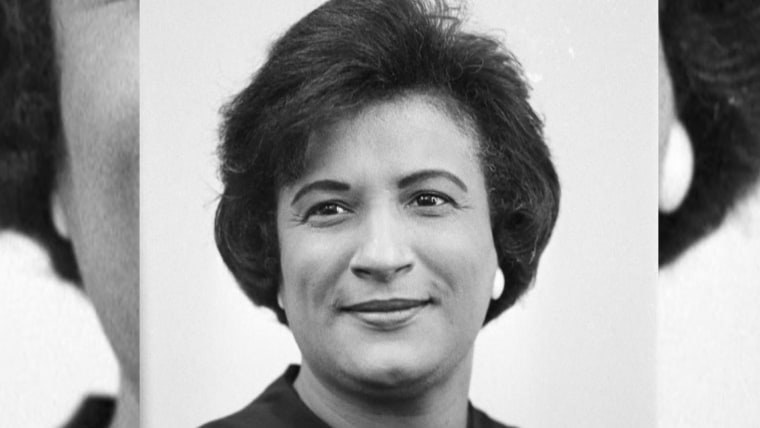Senate Republicans covered a fair amount of ground while whining incessantly yesterday, but as Judge Ketanji Brown Jackson’s Senate confirmation hearings got underway, one name from the recent past came up on multiple occasions.
Here, for example, was Texas Sen. Ted Cruz, complaining about Democrats:
“It is only one side of the aisle, the Democratic aisle, that went so into the gutter with Judge Robert Bork that they invented a new verb, to ‘bork’ someone.”
And here was Nebraska Sen. Ben Sasse soon after:
“We started down this road of character assassination in the 1980s with Judge Bork’s hearings and senators have been engaged in disgusting theatrics ever since.”
If rhetoric like this sounds familiar, it’s not your imagination. In late October 2020, as millions of voters cast early ballots, Republicans on the Senate Judiciary Committee advanced then-Judge Amy Coney Barrett’s Supreme Court nomination, all while complaining about how poorly Bork had been treated decades earlier.
Utah Sen. Mike Lee said at the time, in reference to Bork, that senators “shamefully and slanderously defeated the nomination of one of the country’s most respected lawyers and constitutional scholars.”
Soon after, Sen. Lindsey Graham reflected on the intensity of the conflicts over judicial nominees. “What the hell happened? It wasn’t us,” the South Carolinian said, referring to his party. Graham added that everything changed “with Bork.” Then-Senate Majority Leader Mitch McConnell made the same argument.
As this rhetoric returned to the fore yesterday, it’s worth re-emphasizing that Republicans clearly don’t remember what transpired in 1987 as well as they think they do.
For those who may need a refresher, let’s revisit some of our earlier coverage. Justice Lewis Powell announced his retirement in 1987, and Ronald Reagan soon after nominated Bork. He was immediately seen as one of the most controversial choices in American history.
Indeed, shortly after the president’s announcement, Sen. Ted Kennedy delivered a famous condemnation on the Senate floor: “Robert Bork’s America is a land in which women would be forced into back alley abortions, Blacks would sit at segregated lunch counters, school children could not be taught about evolution, writers and artist could be censured at the whim of government.”
It was a stinging indictment, based largely on fact. Bork, who developed an unfortunate reputation stemming from his role in Richard Nixon’s “Saturday Night Massacre” in 1973, was on record defending Jim Crow-era poll taxes, condemning portions of the Civil Rights Act banning discrimination in public accommodations, and arguing against extending the equal protection of the 14th Amendment to women.
If contemporary Republicans want to argue that the fight over Bork’s nomination was historically significant, that’s true. It was during consideration of Bork that senators largely decided it wasn’t enough to merely consider a Supreme Court nominee’s qualifications; they also had to consider whether he or she was ideologically and temperamentally suited for the bench.
In Bork’s case, it was a test he failed. When his nomination reached the Senate floor, 58 senators, including six Republicans, voted to reject him. (After the vote, Strom Thurmond, of all people, urged the Reagan White House to nominate someone less “controversial.”)
But for GOP senators to argue decades later that his bipartisan defeat somehow did irreparable harm to the confirmation process is difficult to take seriously. In fact, after Bork’s nomination faced opposition from both parties, Reagan nominated Anthony Kennedy, who was confirmed by the Democratic-led Senate, 97 to 0. Another nominee from a Republican White House — David Souter — was also confirmed unanimously a few years later by a Democratic-led Senate.
Three years after that, Ruth Bader Ginsburg was confirmed 96 to 3. Stephen Breyer was confirmed a year later, 87 to 9.
If GOP senators were right, and the Bork ordeal created new norms and fundamentally broke an important Senate function, these examples wouldn’t exist. But they do.
What’s more, let’s not brush past the fact that Bork was given an opportunity: The Democratic-led Senate held full hearings, heard directly from the nominee, and afforded him an up-or-down vote on the floor. Senators from both parties reached an obvious conclusion: Bork was simply too extreme.
In 2016, Republicans, including many of the members who were whining yesterday, denied all of this to Merrick Garland — not because he was a radical ideologue with an indefensible record, but ostensibly because considering a qualified nominee within eight months of an election was deemed impossible, even as GOP senators came to the opposite conclusion four years later.
The fight over Bork was important, just not in the ways Republicans remember.
Related:


